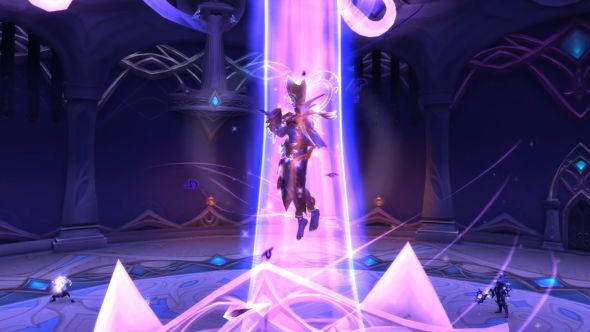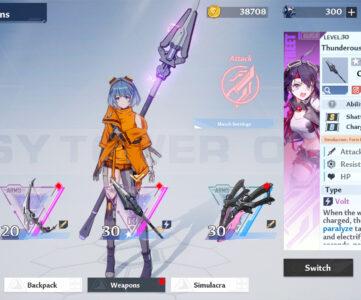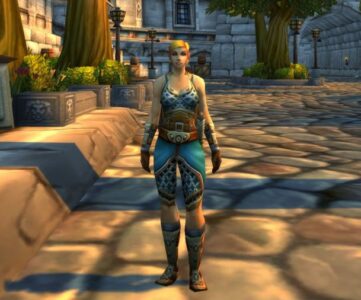[ad_1]
14 hours a day. That’s how long Scott ‘Sco’ McMillan, guild leader of WoW’s number one raiding squad Method, expects to be spending in-game when the latest, hardest dungeon – The Nighthold, Mythic difficulty – unlocks next week. They, along with any other guild hoping to win the illustrious ‘progress race’ to finish a new raid first, have already spent thousands of hours getting their characters prepared – six each, in Method’s case. The reward? Not a cent. Limited sponsorships, minimal support from Blizzard themselves and a community-imposed ban on streaming the latest content mean despite the eSports-level time investment, high-end WoW raiding is done, simply, for the glory.
Up next for the game is World of Warcraft patch 7.2.
“Blizzard are releasing content at an aggressive pace so right now there is really no down time,” explains Sco. “To be competitive we need a main character with 54 AP traits [plus] five alts with 35 traits and an average item level of 880.” For the uninitiated, 54 traits requires 65 million AP, while 35 is in the seven million range. The most efficient way to farm this involves running a single dungeon repeatedly as fast as possible – yielding a couple of hundred thousand a pop, depending on other factors. 880 item level is in the upper echelons of gear progression – not particularly challenging to hit for a dedicated player in a good guild on their main character. But quite a bit tougher to grab across six.
It’s not like this is a policy limited to Method either. Niklas ‘Fastnik’ Larsen is the leader of Danish Terrace, the guild who ranked third in the world for the last raid, Trial of Valor. “When it comes to preparation we’ve had to step up our game compared to previous raid tiers,” he says. “Currently we require our raiders to have one main character and four alts. Going in to Nighthold we’ve set the requirement of 54 traits on our main characters and 35 traits on all alts.”
Those are the basic numbers for preparing, but what about game knowledge? Each of World of Warcraft’s boss fights is a fairly intricate dance of positioning, movement, timing, ability rotation and communication on top of the pure need for health and DPS. Despite what some nostalgic folks may tell you, these have also become harder and more complex at a steady pace over time. They take practice to beat, and Blizzard are happy to provide it on the Public Test Realm as part of their public bug-catching effort, though it’s rare that a highest-tier boss goes down during these periods.
“We’ve made it obligatory to attend PTR raid tests,” says Fastnik. “All raiders will have to take part. This is just to make sure we have an idea of what tactics we could possibly use on the various bosses even before they have been released. Also, by having all raiders attend we can get a pretty rough idea of what classes might be strong and what classes might lack in certain situations on the various encounters.”
The imperfect balance between classes is why these top guilds demand multiple alts, and why Legion’s introduction of AP traits and legendaries has caused so much trouble. If you’re going to do well in the progress race, those small percentage DPS and survivability advantages matter and you want your great players on the best classes available.
Working all that out is another job that needs to be done in the weeks prior to a new raid. “We as officers of the guild [ensure] that everything is running smoothly towards Nighthold,” explains Sco. “We need to make sure our raiding roster is available, that we can run the setups that we want to run, and that boss strategies are developed in advance so that we have minimal downtime.” He also mentions the development of mods, WoW’s default UI having long been outshone by numerous community-created tools. Those are generally customisable, and everyone needs to have the exact alerts and triggers they want in place before setting foot in a new dungeon. Each boss is unique, and each role has unique interactions with it – that’s a lot of work.
It’s also expected that guilds provide some of the consumables needed to maximise the effectiveness of every boss attempt. Here’s Method’s 15,000 augment runes, for each of their 20 raiders to chug for every single one of the hundreds of boss pulls they’ll be doing next week. These are mostly bought from the auction house, using guild gold earned from various tasks in-game as well as the selling of raid runs to other players.
Almost ready for #Nighthold… @Warcraft pic.twitter.com/QKkAzg3s7e
— Method (@Methodgg) January 13, 2017
Again, the eSports comparisons are easy: match preparation, team management, strategy practice – it all happens in WoW PvE too. Even a little lower down the ladder, being ready for fights is an expected time investment from anyone wanting to take on bosses. Adrian ‘Sparty’ Greszata leads Death Jesters, a guild that’s been running since the earliest days of vanilla. They’re a decade clear of their super-hardcore days, making a happy home beating content before it becomes irrelevant and hitting between US top 50 and 100. Sparty spends the time he’s not working as a lifeguard or playing WoW doing Coach’s Corner on Twitch, a weekly raid prep and guild-leading tutorial.
“We have [mods] set up and created through our team as well as strats finalized in advance with cooldowns, assignments, diagrams,” he says. “We have logs of PTR [testing] as well as other guild’s logs that we look at to adjust strats and and allocate DPS. We create videos to teach players what we’re doing and [how to do] the encounters. All players are expected to learn to use logs, look at their performance and give input.
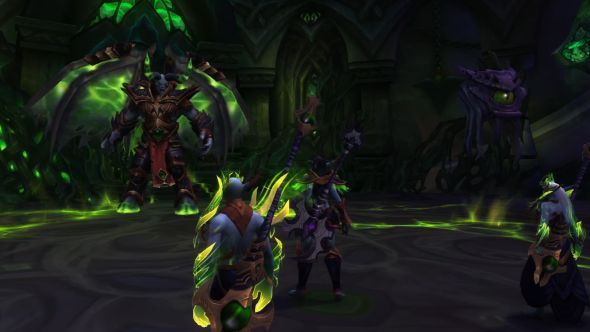
“This tier we have split bosses up between different players in the guild and have asked them to build the strats for the guild. This enforces much more collaboration between senior members, officers as well as the newer members. I’ve been leading for 12 years and I won’t be here forever so it’s important to train the next generation of raid leaders and tacticians. I’ve found it will help players understand mechanics and understand the ‘why’ rather than just following a strategy.”
Despite all that, Death Jesters won’t be bringing down Gul’dan, Nighthold’s final and long-awaited boss, in that first week. In fact, it’s a much longer process for them according to Sparty. “With a ten-hour raiding week I would expect us to complete [it] in about three months. The average Mythic guild will kill one or two bosses per week and then spend a couple weeks on the tougher bosses.”
That’s the standard. Normal. Vaguely human, even if ten hours on a single game every week, at bare minimum, is more than most of us dedicate. For Danish Terrace and Method, it’s far more serious business. Time is taken off work and school, holiday is used up and both sleep and breaks are regulated.
“Typically, during progress, we raid for 14 hours per day – taking eight hours for sleep and a combined total of a couple of hours for breaks throughout the day,” predicts Sco for Method. “We can expect about ten days of progress before people start running into possible attendance issues.”
Meanwhile Fastnik is planning on “starting on Wednesday as soon as the raid opens at 08:00 and raiding until midnight.” That’s for the first five days, at which point Danish Terrace will revert to their ‘normal’ raid schedule – 18:00 to midnight Monday-Thursday, 12:00 to midnight at the weekend. That will last, at least, until the raid is done with.
Between those two guilds and their 40 combined raiders, that’s 4,040 man-hours for the first week alone. You could build a pretty impressive house with that sort of time and skilled labour. There will be hundreds upon hundreds of boss wipes in there, with Fastnik predicting that the final two bosses, as well as the Star Augur and High Botanist Tel’arn, will be particular challenges. Sparty has his eye on Tel’arn and the raid’s finalé as well, and expects many guilds to struggle on Trilliax and Tichondrius earlier on.
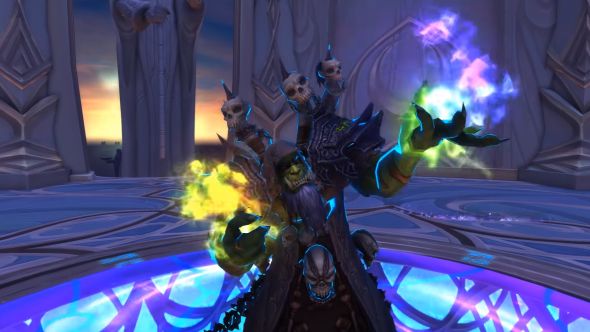
Sco doesn’t have any particular fears, boss-wise – though he notes that Mythic balancing can always mess people up – but does think that Method can, once again, finish first and take the title of de facto best guild in the world for another cycle. “I am very confident that we as a guild and team have what it takes to achieve another world first. We have put in a lot of preparation and we are hungry for it. The guild exists to go for world first so anything less would be disappointing for us. In general going into these progress races you need to be confident in your own ability, and the team’s – if you don’t have that confidence in yourselves then why would anyone else?”
That, at the end, is what all the preparation and playing and wiping and calculating leads towards – a world ranking, and the knowledge that you beat the boss. While Method will only be satisfied to win the race, Danish Terrace aren’t even bothered about maintaining their number three spot, they just want to keep in the top ten. Death Jesters will be happy as long as they eventually kill Gul’dan, preferably before the next tier of raids is released.
In the modern world, is it enough? Putting in well over forty hours a week regularly, and much, much more in times such as this, is a big ask for no payoff. Ten years ago during WoW’s inception that was true of anyone with a fanatical devotion to videogames, but now there’s at least the promise of reward at the top of most games, whether it’s multi-million dollar tournaments or revenue from Twitch subscribers. For WoW raiding, that’s just not how it works.
Streaming by top guilds is discouraged during the progress race. Why? Sparty explains: “The simplest answer is for strategies, maintaining a competitive edge over their adversaries. You absolutely do not want other guilds to keep the same pace as you in clearing bosses, [so] releasing videos to help them serves little purpose. There has been an unwritten rule that guilds would not release videos until at least five in total had defeated that [boss] to help protect the rankings as well as the ‘sanctity’ of the encounters.”
Sco confirms as much, explaining that “streaming the progress race is going to be a very hard sell, even with substantial incentives – keeping in mind that any incentive has to be split between so many people in a raiding guild. A big part of progress raiding is developing a clever strategy to overcome the difficult challenges faced. By streaming the raid this strategy would be instantly leaked to the competition who could adopt it into their own strategy and move ahead of you.”
For Danish Terrace, this unofficial policy has actually changed how they operate. “[We’ve] always had the mentality that we want to be able to show people high-end PvE content in a way other guilds didn’t,” says Fastnik. “As we’ve been aiming higher and higher, that mentality has been working against our goal. The solution to this has been to find a middle[ground]. What we ended up doing was agreeing on streaming the bosses that had already been killed before us, and then when we came to a boss none or few guilds had cleared, we’d turn off our streams.”
So what’s the solution, if one is needed? Method have managed to build a brand around their repeated successes over the past ten years, creating PvP teams and entering the eSports scenes of other games. They’re a proper business with a full management team, a community overseer, news site, sponsors, and everything you’d expect out of a modern gaming organisation. That’s simply not an option for everyone, especially if their main game of WoW PvE doesn’t yet support development in the way Hearthstone, LoL, Dota 2 and CS:GO have built teams over the past few years.
“We do want to see more support given towards the progress race and there is definitely interest there,” says Sco. “I think it would be more realistic to look at support for the race one step before streaming initially. It is possible that Method could even lead the charge in this regard, working with partners to reward the top finishers of the race.”
Exorsus, the guild that first beat Legion’s launch raid, Emerald Nightmare, posted on Reddit a couple of months ago (in the wake of being banned for exploiting on Helya) saying that they wanted to see money coming from Blizzard to support the race, turning it into a proper eSport. Sparty picks some holes in that with a variety of questions:
“I think the logistical hurdles are massive. Do raiders sign contracts, see profit sharing? How large can rosters be? What is the fairest measure of progress, since EU and US [servers] start on different days? What of clear exploits, like [on Helya]?” He, Sco and Fastnik all mention the ‘races’ that have taken place at BlizzCon in the past, challenging guilds to beat raids in record time, up against each other. “[I] would love to see variants of those return rather than guilds streaming 400+ wipes on Helya.”
For these three guilds, and the 338 others that WoWProgress registers as having bested Helya (plus thousands more that raid at other levels), the race is its own reward. And it probably will be for years to come, even though Fastnik says Danish Terrace have lost raiders due to the extreme time commitments of keeping characters geared outside of progress time. But the game needs to grow if it is to survive, and with more eyes than ever before on its players, personalities and developers, particularly whenever new content arrives, the old standard might not survive for long.
“Streaming higher end progression has gained popularity lately,” says Sparty. “Those Twitch views eventually turn into subscribers if you can capitalize on it. It’s free marketing, and a revenue stream for guilds. These turn into coaching sessions, merchandise, and a brand. I think we’ll be seeing more guilds follow this methodology, rather than renegade guilds streaming. It will become more common practice among the top 20 guilds. This paradigm shift is [evidently] coming, and is the first step to turning raiding into a potential eSport.
“Whether it will catch Blizzard’s eye and become profitable remains to be seen,” he says, jovially adding “but I think raiding as an eSport has a better chance than legacy servers.”
[ad_1]

